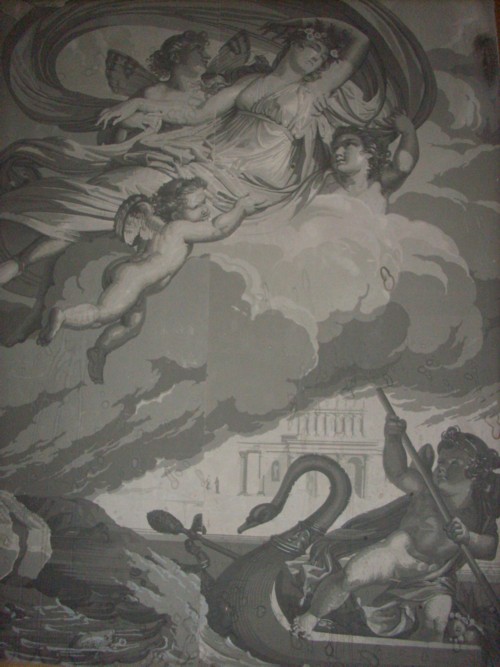La scoperta dell'isola di Utopia
LA SCOPERTA DELL'ISOLA DI UTOPIA
Leuven, 3-5 ottobre 2008
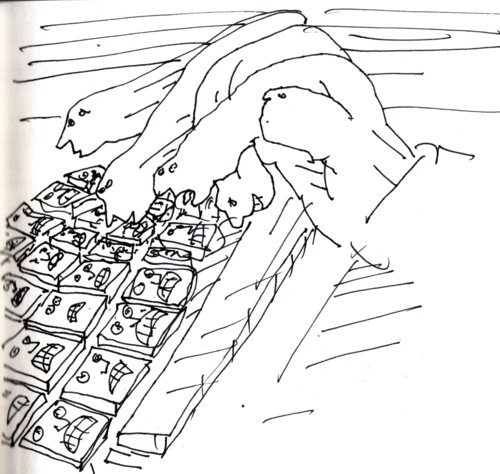
I disegni tratti dal moleskine n. 31
sono un'interpretazione estemporanea e un supporto mnemonico di vari momenti del workshop
Le foto sono state scattate nei giorni del meeting
© 2008 by Massimo Presciutti Siae / Arsny
"Dirò dunque qualcosa d'una parola mia vecchia amica: ossia di quella curiosa «serendipità», che trovate nei dizionari inglesi e che fu coniata dall’inglese Horace Walpole (spirito caustico ed estetizzante, morto nel 1797) a partire dal racconto fantastico intitolato I tre Principi di Serendip – dove Serendip è l'antico nome di Ceylon. I tre principi essendo tre giovani che scoprono continuamente, «virtù del caso e della sagacia», cose di cui non vanno minimamente in cerca, serendipità venne a significare «facoltà di fare, per caso, scoperte felici e inattese» (Hendrik Willem van Loon, "Le Arti", Dall'Oglio Editore, Varese 1983, p. 76 © 1937 by Hendrik Willem van Loon).
Hendrik Willem van Loon, nato a Rotterdam, come Erasmo, l'amico di Tommaso Moro e membro della stessa comunità virtuale di François Rabelais, fu un famoso divulgatore e appassionato maestro nell’anima, per citare una canzone di Paolo Conte, considerato che un maestro è un paladino creativo la cui creatività si esplica non tanto nei contenuti o nelle forme originarie ma nei modi attraverso i quali tali contenuti e forme vengono a disegnare un'architettura dove coabitino crescita biologica e affettiva, acquisizione di abilità e capacità progettuali, immagini e azione (immaginazione), ovvero facoltà di riconoscere o inventare utopie.
Dal finestrino dell'aereo individuo "Le plat pays" di Jacques Brel, il background dei miei viaggi europei potrebbe essere sentimento di cristallo, molecola di ferro con i suoi nove atomi, ingranditi 150.000.000 di volte, o altre metafore messe in scena da quei coraggiosi viaggiatori spaesati che tennero a battesimo i luoghi sfiorati con la loro leggerezza insostenibile.
Et de noirs clochers comme mâts de cocagne
Où des diables en pierre décrochent les nuages
Avec le fil des jours pour unique voyage
Et des chemins de pluie pour unique bonsoir
Avec le vent d'ouest écoutez-le vouloir
Di Leuven non conosco canzoni, ma conosco una copertina, la copertina di un libro che stiamo leggendo in classe, "Utopia", una riproduzione della xilografia intitolata "L'isola di Utopia" utilizzata per la prima edizione dell'opera di Tommaso Moro, stampata, scoperta felice e inattesa, a Lovanio (Leuven) nel 1516.
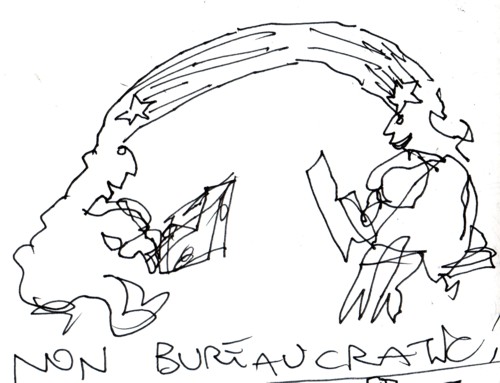
I ragazzi dell'Erasmus di Leuven si mescolano con l'eterna gioventù degli utopisti di tutti i tempi che in questa terra dove la pioggia ti accarezza e quasi non ti bagna, la stessa che avevo già notato in Galles nell'aprile del 1998, ricordano ai nani dell'alta finanza che si studia perché si è giovani, si ha voglia di vivere e di innamorarsi, perché si è forti e spensierati, perché si sbaglia e ci si corregge per sbagliare di nuovo fino a trovare la propria strada, perché a volte ci si apparta in possibili isole sottobraccio alla bellezza, perché è bello sentirsi alti sulle spalle dei giganti - "Siamo tutti nani sulle spalle dei giganti" (Umberto Eco, "Corriere della Sera", 19 luglio 2001) e godersi tutta la storia che scorre come un torrente primaverile, si studia perché si è giovani finché si è capaci di imparare e non soltanto per avere diplomi o lauree di carta. "La poetica di Jacques Brel è riassumibile sostanzialmente nell'antitesi vita/morte: la vita è gioventù, tenerezza, gioia, conoscenza; la morte è imborghesimento, conformismo, falsità, sopraffazione" (Giovanni Vacca, "Il «santo» Brel", sta in Alias, supplemento settimanale de Il Manifesto, anno 9, numero 40, sabato 11 ottobre 2008).
Il Belgio è piatto? E allora giù boschi, boschetti, cattedrali gotiche, geometrie di tutti i tipi che rendono nitida la vaghezza della nebbia, luci di Magritte che qui soltanto brillano.
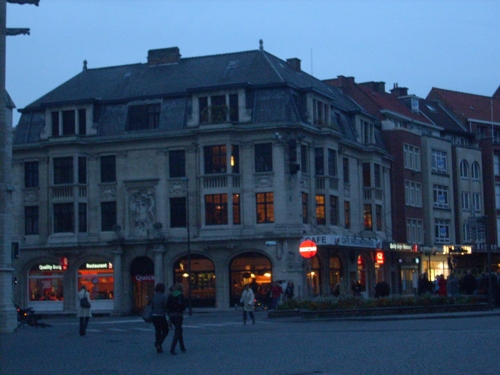
Appena i miei piedi toccano l'entrata del Novotel Leuven in Vuurkruisenlaan ha inizio la sfida quasi darwiniana di adattamento a orchestrazioni di codici, lingue, linguaggi, idiomi, sorrisi, danze involontarie, adesioni volontarie, riconoscimenti e agnizioni. Continuo a tracciare segni e disegni, appunti e citazioni colte da un fiume incontenibile di lingua inglese e francese nella sua espansione vallone senza parlare poi del fiammingo dai sapori tedeschi, del tedesco tout court, dell'italiano, ormai lingua madre un po' assente e del greco antico attraverso il quale in modo divertito e in perfetto stile nen echten duvel ("un vero diavolo") conversano Thomas Debrux e Nikolaos Giakallis facendo da colonna sonora al mio inglese basic affettivo che si incrocia con altre enfatiche conversazioni.
Un curricolo accurato e in progress comincia a snodarsi nelle stanze dei workshops, quasi un cielo stellato in una stanza, una premessa e promessa d'alba, si parla di gioventù e cultura, di nuove domande e nuove conoscenze, di conformità e divergenza, di standard e originalità. Di eTwinning come processo più che progetto e del contributo eTwinning al curricolo. Isole nella corrente che investono il vissuto a tutti i livelli come tutte le grandi invenzioni, le ICT rendono la nostra vita completamente diversa rispetto a prima, le loro potenzialità si affacciano sull'infinito, giganti pantagruelici o golem fuori controllo umano.
Mi rendo conto che tutto ciò che mi avvolge offre aiuti attraverso suggerimenti inaspettati e determinanti. Io credo, in folta compagnia, che le migliori radici per il nostro futuro siano immerse nel terreno fertile dell'entusiasmo, del fervore, della passione, dell'energia, del gusto e che le ICT ci diano la possibilità di immetterci in una nuova era dove la nostra anima sia allo stesso tempo la nostra singolarità e molteplicità in espansione istintiva e logica, senza nessuna volontà di conquista che non sia conquista di saperi. "È proprio dell'anima come del ferro. Sotto i colpi ripetuti essa si contrae, prende una forma, si fa più resistente" (Jules Verne, "César Cascabel", 1890, Gruppo Ugo Mursia Editore, Torino 2004).
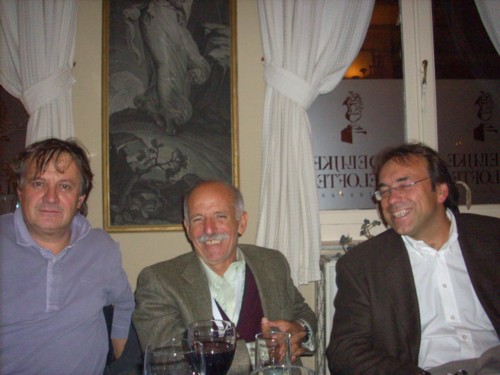
E lo stile europeo intanto si va formando anche attraverso l'interpretazione teatrale ed enfatica dei conduttori dei workshop: inutile cercare pause sbagliate, stonature, sbavature negli interventi di Uten Liemingen, Conor Calvin e degli altri dove le ICT vengono ad essere, più che un'invenzione per rendere la vita più comoda, una vera e propria scoperta, un magico accordo lungo cinquecento anni che va dalla scoperta dell'America dei tempi di Erasmo, Moro, Rabelais, alla scoperta del cuore dello spaziotempo da parte di semplici cittadini attraverso l'uso umanistico delle nuove tecnologie.
Le nuove tecnologie per essere vive hanno bisogno di umori cinquecenteschi e di humour fine millennio, come l'immagine delle Twin Towers proiettata durante uno dei workshop dove c'era l'idea di una foto ricordo che un tipo sorridente e ignaro si faceva fare mentre dietro a lui si vede spuntare uno dei due aerei. L'immagine fotografica, disegnata sul mio moleskine e ridisegnata sul paper–board di classe, mi offrirà lo spunto per suggerire pensieri sull'utopia e l'occasione di raccontare ai ragazzi qualcosa sul workshop. Humour come filo di Arianna del Lifelong Learning.

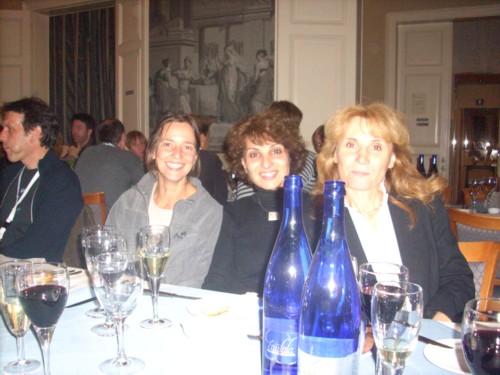
Lo stesso filo di Arianna che mi porta a dieci anni prima, Castello di Cardiff, il Galles di Sir Bertrand Russel: "Gli esseri umani hanno la capacità di godersi spontaneamente le cose, ma i moralisti e i pedanti se ne impadroniscono, e dopo averne estratto quel ch'essi considerano il veleno del piacere le lasciano lugubri e tristi e sprovviste di tutto ciò che dà loro valore. Shakespeare non scriveva con lo scopo di annoiare i ragazzi di scuola, ma con l'intenzione di rallegrare il suo pubblico. Se uno non trova il suo piacere a leggerlo, è meglio che lo lasci da parte" (Bertrand Russel, "Nuove speranze in un mondo che cambia", Longanesi, Milano 1952).
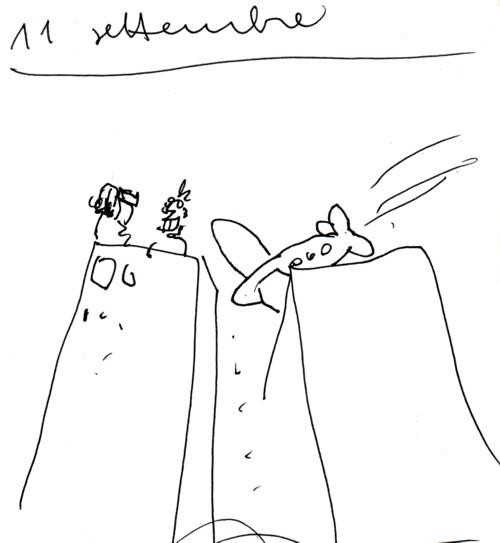
when life was slow and oh, so mellow.
Try to remember the kind of September
when grass was green and grain was yellow.
Try to remember the kind of September
when you were a tender and callow fellow,
Try to remember and if you remember the follow.
Tom Jones lyrics
Veleno del piacere che corrisponde, per quanto riguarda il mio mestiere di docente, all'humour nero di André Breton: "Diventa sempre più lecito pensare, viste le esigenze specifiche della sensibilità moderna, che le opere poetiche, artistiche, scientifiche, i sistemi filosofici e sociali privi di questa specie di humour lascino molto a desiderare e che siano condannate a perire più o meno rapidamente" (André Breton nel 1939, sta in AA.VV., "Humour mon amour", Rassegna di umorismo grafico 1940–1982, Comune di Fiesole, Azienda Autonoma di Soggiorno e Turismo di Fiesole, testi di Luigi Malerba, Graziano Braschi, Berlinghiero Buonarroti. Incontro con Cesare Zavattini a cura di Paolo della Bella, Il Candelaio Edizioni, Firenze 1982). Per dare ordine al caos, forse, non c'è niente di meglio della filosofia surrealista, la stessa che viene fuori, per esempio, immettendo un nome in Google Immagini.
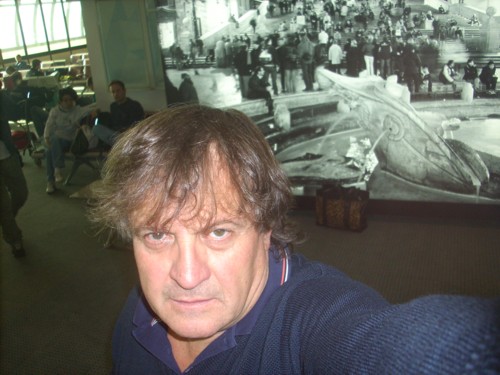
THE DISCOVERY OF THE UTOPIA ISLAND
Leuven, October 3-5, 2008
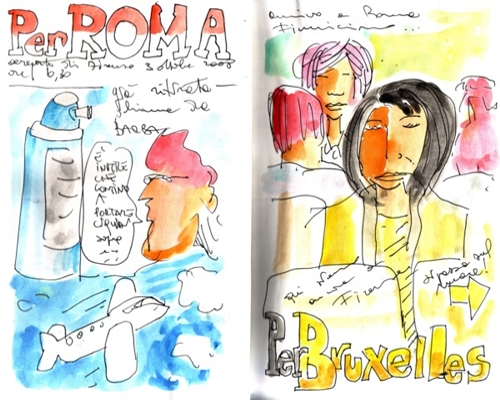
are an impromptu interpretation and a mnemonic help of various moments of the workshop
The pictures was taken during the days of the meeting
© 2008 by Massimo Presciutti Siae / Arsny
From the Photo of Don Hunstein
© 1967 CBS Inc. Production / Printed in Holland
"Hendrik Van Loon has a chapter in his book The Arts devoted to the archeological work of Heinrich Schliemann, which is subtitled «A Short Chapter Which for the Greater Part is Devoted to an Explanation of the Word 'Serendipity'» (Hendrik Van Loon, The Arts, Simon and Schuster, New York 1937, p. 64). He introduces the word as follow: "I want to say something about my old friend «serendipity»". His «old friend» is then amply defined, explained and illustrated in the remainder of the chapter "for the benefit of those many who had not had the privilege of making its acquaintance" (...) "I call Serendipity, a very expressive word, which, as I have nothing better to tell you, I shall endeavour to explain to you: you will understand it better by the derivation than by the definition. I once read a silly fairy tale called the three Princes of Serendip: as their Highnesses travelled they were always making discoveries, by accidents and sagacity, of things which they were not in quest for: [...]" (Robert King Merton e Elinor G. Barber, The Travels and Adventures of Serendipity: A Study in Sociological Semantics and the Sociology of Science, Princeton University Press, 2004).
Hendrik Willem van Loon was born in Rotterdam, like Erasmus, friend of Thomas More and belonging to the same community of François Rabelais, was a well-known disseminator and a maestro on the soul, remembering a Paolo Conte's song, considering a maestro a fertile champion whose creativity comes true not so much in the original contents and forms but on the ways by which this contents and forms come to outline an architecture where they are in biological harmony and emotional growth, acquisition of planning abilities and competences, images and action (imagination), that is the ability to understand and invent utopias.
Through the porthole of the plane I distinguish "Le plat pays" of Jacques Brel, the background of my European journeys could be a crystal feeling, iron molecule with its nine atoms, enlarged a 150.000.000 times, or other metaphors staged by those brave awkward explorers. They were giving an identity with their unbearable lightness to the grazed places.
Et de noirs clochers comme mâts de cocagne
Où des diables en pierre décrochent les nuages
Avec le fil des jours pour unique voyage
Et des chemins de pluie pour unique bonsoir
Avec le vent d'ouest écoutez-le vouloir
I don't know any songs about Leuven but I know a cover, a cover of a book that we are reading in my class, "Utopia", a print of the xylograph titled "Utopia Island" used on the first edition of the masterpiece by Thomas More, printed, happy and unexpected discovery, in Lovanio (Leuven) in 1516.
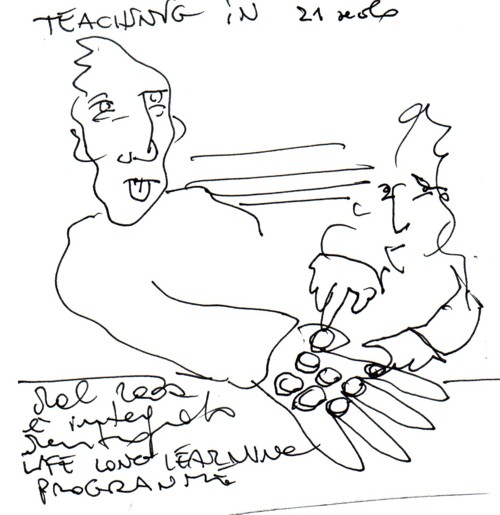
The Erasmus students of Leuven mingle in the eternal youngness of the utopians of all the times that in this land where the rain, the same rain I saw in Wales in 1998 April, it caress you and perhaps doesn't damp you, they remember to the dwarf of the high finance that they are studying because are young, they are alive and falling in love, they are strong and carefree, because they miss the target and correct themselves to mistake again and again until finding his own way, because can happen to withdrew on the possible islands arm in arm with the beauty, because it's wonderful to feel high standing on the shoulders of the giants – "Nani gigantum humeris insidentes" (Umberto Eco, "Corriere della Sera", 19 July 2001) - and to enjoy all the history passing by way of a spring like torrent, they study because we are young until we can learn and not only to get paper diplomas or degrees. "The Jacques Brel poetic it's essentially summarizable in the antithesis life/death: the life the youth, tenderness, joy, knowledge; the death is acceptance of a bourgeois way of life, conformism, falseness, bullying" (My traslation from Giovanni Vacca, "Il «santo» Brel", sta in Alias, supplemento settimanale de Il Manifesto, anno 9, numero 40, sabato 11 ottobre 2008).
It's a Belgium a flat countryside? And then its people let out a string of woods, little woods, Gothic cathedrals, all kinds of geometries causing the become clean – cut the fog vagueness, Magritte lights only here shining.
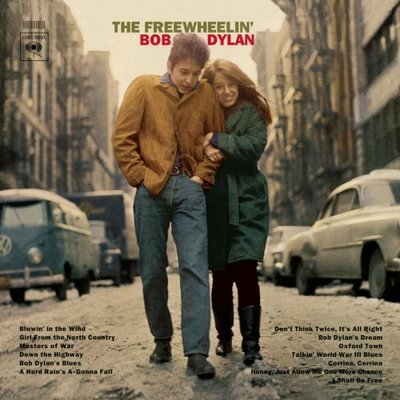
An image of youth, tenderness, joy, knowledge
http://en.wikipedia.org/wiki/Talking_World_War_III_Blues
Cover photo Don Hunstein
I had just arrived to the hall of Novotel Leuven in Vuurkruisenlaan when it starts the quasi-Darwinian challenge about the ability to adapt to the orchestrations of a codes, languages, idioms, smiles, involuntary dances, voluntary adhesions, recognitions and agnitions. I was continuing to draw a signs and drawings, notes and well-read citations from an uncontrollable endless words in English and French language, in French language from the Walloon point of view, to say nothing of the Flemish with the German flavours, the German tout court, the Italian (a mother language a little absent-minded) and the ancient Greek by which Thomas Debrux e Nikolaos Giakallis was talking with an amused look and an excellent style nen echten duvel ("a true devil") doing a soundtrack to my feeling basic English crossing with other emphatic talks.
A meticolous and in progress curriculum come undone to the workshops rooms, almost a starry sky inside a room, a prelude and promise of sunrise, people talk about youth and culture, new questions and new knowledge, concordance and divergence, standard and originality. About eTwinning like process more than project and the eTwinning contribution to the curriculum. Island in the Stream regarding past experiences on all plane like all great inventions, the ICT make our life quite other than before, their potentialities look into the infinity, Pantagruelian Giants or Golem out the human control.
I realize all around me give aids by means of unexpected and positive suggestions. I think, of course not only me think that, the best roots of our future dive into the fertile ground of the enthusiasm, fervour, passion, eagerness, spice and the ICT give us the scope for introduce us into a new age where our soul is, at same time, our growing instinctual and logical singularity and multiplicity, without any desire to conquest other thing that the conquest of knowledge. "En vérité, il en est de l’âme comme du fer. Sous les coups répétés, elle se contracte, elle se forge, elle devient plus résistante" (Jules Verne, "César Cascabel", 1890, La Bibliothèque électronique di Québec, Collection À tous les vents, Volume 242 : version 1.0).
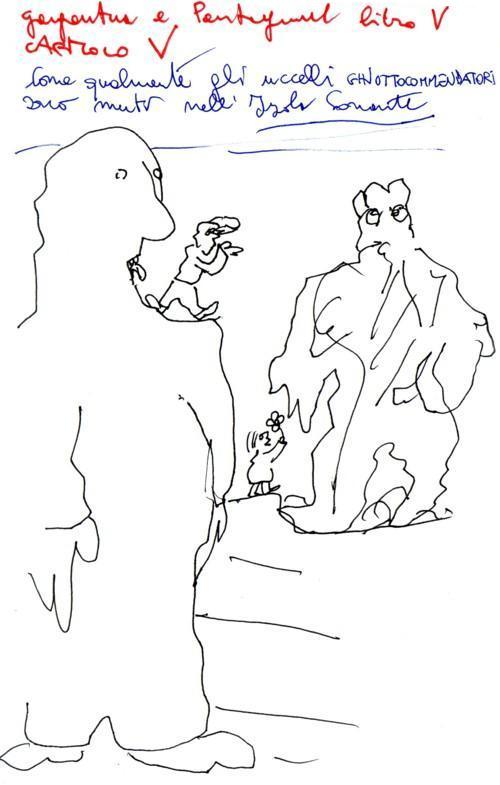
And the European style well is forming also through a theatrical and emphatic interpretation of the workshops hosts: needless to find wrong pauses, wrong notes, flaws in the speech of Uten Liemingen, Conor Calvin and other experts where the ICT are, more than an invention in order to make the life more comfortable, a real discovery, a magic concordance along five hundred years, from the discovery of America in the time of Erasmus, More, Rabelais, to the discovery of the space time heart by a single citizens by means of the humanistic use of the new technologies.
New technologies to be alive need of moods of sixteenth century and of humour of end millennium, like the image of Twin Towers projected during one workshop where it was the idea of a memory photo taken to an unaware smiling type even as behind him we can see one of two airplanes looms up. The photographic image, drafted on my moleskine and redrafted on the white board class, it will give to me the cue to suggest ideas about the utopia and the opportunity to tell to the pupils something about the workshop. Humour like Ariadne's thread of Lifelong Learning.
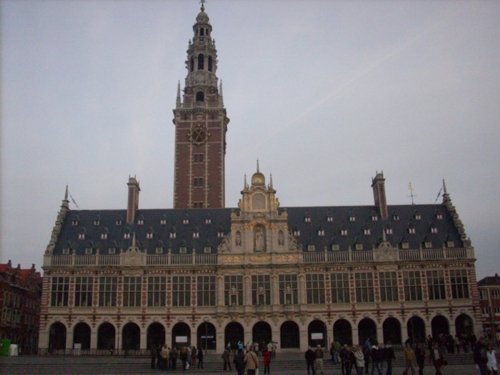
The same Ariadne's thread bring myself into ten years ago, Cardiff Castle, the Welsh of Sir Bertrand Russel: "Human beings have certain capacities for spontaneous enjoyment, but moralists and pedants possess themselves of the apparatus of these enjoyments, and having extracted what they consider the poison of pleasure they leave them dreary and dismal and devoid of everything that gives them value. Shakespeare did not write with a view to boring school-children; he wrote with a view to delighting his audiences. If he does not give you delight, you had better ignore him" (Bertrand Russel, "New hopes for a changing world", Simon & Schuster, New York 1951).
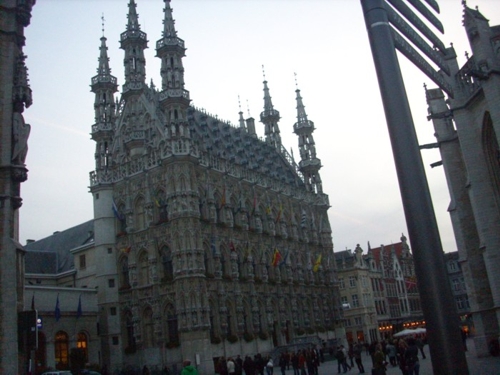
Au cœur de septembre
Entre la pluie
Et l'hirondelle
Seuls dans ma chambre
Au cœur de septembre
Quand vient la nuit
Je me rappelle
Seuls dans ma chambre
Nous vivions ensemble
D'un cœur nouveau
Des amours nouvelles
Seuls dans ma chambre
La vie était tendre
Et belle, belle, belle.
Anaïs, French version
Poison of pleasure coinciding, in regard to my work of teaching, to the black humour by André Breton: "It's always more difficult to think, because the specific exigencies of modern sensibility, that the poetic, artistic, scientific works, the philosophical and social systems devoid of this kind of humour leave a great deal to be desired and they are condemned to perish more or less rapidly" (My translation from André Breton nel 1939, sta in AAVV, "Humour mon amour", Rassegna di umorismo grafico 1940–1982, Comune di Fiesole, Azienda Autonoma di Soggiorno e Turismo di Fiesole, testi di Luigi Malerba, Graziano Braschi, Berlinghiero Buonarroti. Incontro con Cesare Zavattini a cura di Paolo della Bella, Il Candelaio Edizioni, Firenze 1982). To make order out the chaos, maybe, nothing of better than the surrealist philosophy coming out, for example, keyboarding a name in Google Images.
